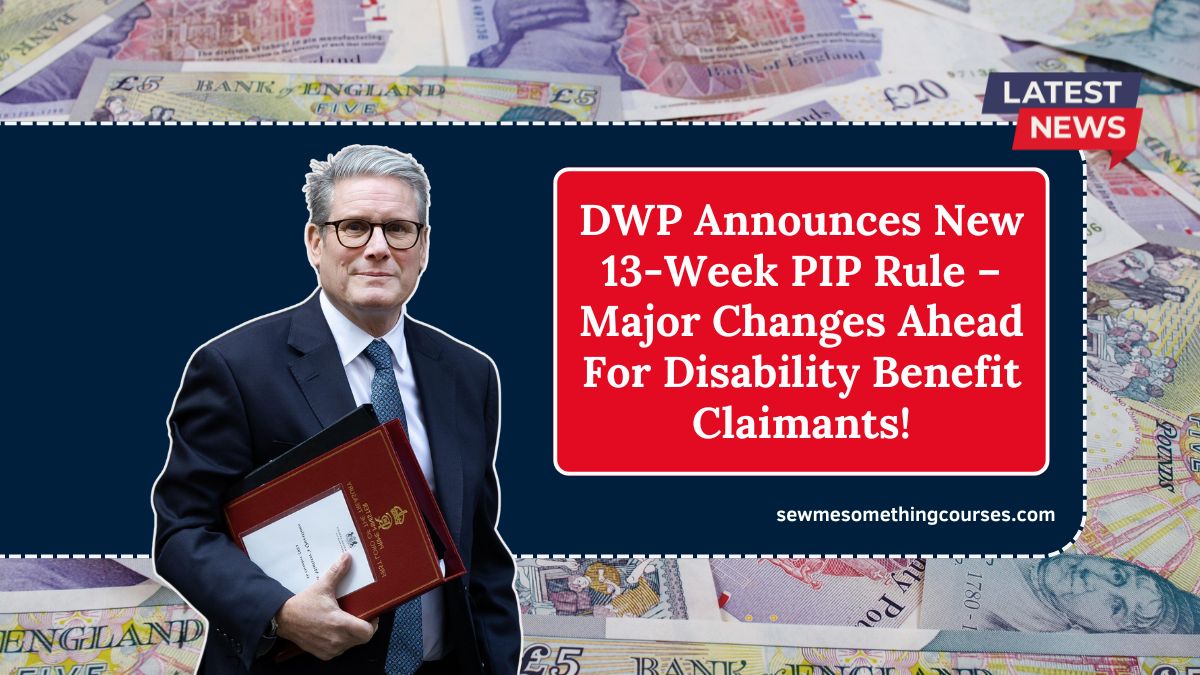The Department for Work and Pensions (DWP) has officially announced a new 13-week transitional rule for Personal Independence Payment (PIP) claimants, ahead of sweeping changes to the UK’s disability benefit system.
This move comes as part of the Universal Credit and PIP Reform Bill, aimed at reducing the benefits bill and tightening eligibility for disability benefits.
With over 3.7 million PIP recipients across England, Wales, and Northern Ireland, these changes will impact a large segment of vulnerable individuals.
Here’s what you need to know about the new 13-week PIP rule, how the system is changing, and what it means for current and future claimants.
What Is PIP and Who Receives It?
Personal Independence Payment (PIP) is a disability benefit that helps people with daily living tasks or mobility needs resulting from a physical or mental condition.
Unlike Disability Living Allowance (DLA), PIP is not based on diagnosis, but on how the condition affects your life.
PIP is awarded in two components:
- Daily Living: Standard rate £73.90 / Higher rate £110.40 per week
- Mobility: Standard rate £29.20 / Higher rate £77.05 per week
You could receive up to £749.80 every four weeks if eligible for both high-rate components.
What Is the New 13-Week Rule?
As part of upcoming reforms, the DWP has introduced a 13-week transitional protection period. If a claimant is deemed ineligible for the daily living component due to upcoming rule changes, they will continue receiving payments for 13 weeks before the payments stop.
| Previous Protection | New 2025 Transitional Rule |
|---|---|
| 4 weeks (DLA to PIP transition) | 13 weeks from PIP reassessment |
| Applied to DLA-only claimants | Now applies to current PIP recipients |
| No transition for new rules | Now includes rule change scenarios |
This transitional rule is aimed at softening the financial blow of losing eligibility, giving affected individuals time to adjust or appeal decisions.
Who Will Be Affected by the Rule Change?
The changes target individuals who may no longer meet the tightened eligibility for the daily living component of PIP. This includes:
- People previously eligible due to scoring points across multiple smaller tasks
- Carers receiving Carer’s Allowance, who lose entitlement if the cared-for person loses PIP eligibility
- Universal Credit claimants receiving the carer’s element
Those on the mobility component only are not affected by these changes.
How Is PIP Changing?
The government is reforming the assessment process to focus more on specific tasks and raise the qualification threshold.
| Old Assessment Criteria | New Assessment Rules (from Nov 2026) |
|---|---|
| Total points across various activities | Must score at least 4 points in a single activity |
| Mix of moderate difficulties accepted | Must demonstrate significant difficulty in key areas |
| Telephone/video assessments common | Majority of assessments to be face-to-face |
| Frequent reviews across all cases | Exemptions for permanent or deteriorating conditions |
The government argues this creates a more sustainable and accurate benefits system, but charities warn it could leave many without essential support.
Reactions and Concerns
While the DWP says the new 13-week buffer is generous, critics argue it doesn’t go far enough.
Turn2us CEO Thomas Lawson said:
“There is no moral justification for cutting the support that allows sick and disabled people to meet their basic needs… stripping away support will push people deeper into hardship.”
What If You’re at Risk of Losing PIP?
Here’s what you can do if you’re concerned:
- Keep up to date with letters from the DWP
- Request mandatory reconsideration if you disagree with an assessment
- Appeal to a tribunal with supporting documents and medical evidence
- Contact disability support charities like Citizens Advice or Turn2us
What Stays the Same?
- No changes to the PIP mobility component
- Individuals with permanent or worsening conditions may be exempt from regular reassessments
- Face-to-face assessments will be prioritized, but adjustments will be made for those unable to attend in person
Quick Summary of PIP Changes
| Component | Change |
|---|---|
| Daily Living | Stricter scoring criteria from Nov 2026 |
| Mobility | No changes announced |
| Carer’s Allowance | May be affected if cared-for person loses PIP |
| Assessment Method | More in-person, less remote |
| Transitional Protection | 13-week payment continuation if disqualified |
The DWP’s announcement of the 13-week PIP rule marks a significant shift in how disability support will be administered in the UK.
While it offers temporary protection, the tightened criteria and increased reassessments mean that many could face loss of income unless they meet more stringent standards.
If you or someone you care for receives PIP, it’s vital to stay informed, prepare for reassessment, and know your rights under the new system.
With changes set to begin from November 2026, there’s still time to prepare—but early action and awareness could make all the difference.
FAQs
When will the new 13-week PIP rule come into effect?
The 13-week transitional rule is tied to the broader PIP reform rollout, which begins in November 2026.
Will the mobility component of PIP be affected by these changes?
No. The changes only apply to the daily living component at this stage.
Can I appeal if my PIP is stopped?
Yes. You can request a mandatory reconsideration, and if denied again, submit an appeal to a tribunal.

